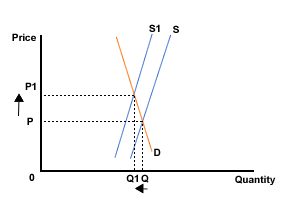Causes of changes in the Terms of Trade
Syllabus: Explain that the terms of trade may change in the short term due to:
- changes in demand conditions for exports and imports, changes in global
- supply of key inputs (such as oil),
- changes in relative inflation rates and
- changes in relative exchange rates.
Causes of changes in terms of trade in the short run and long-run:
Short-term
The terms of trade is the price
relationship between a country's exports and imports and will,
therefore, be influenced by all the factors which determine the prices of imports and exports (PoPzYTEP again)
In the short-run, changes in relative prices of imports and exports can be caused by fluctuations in exchange rates,
particularly where countries operate a floating exchange rate system.
Exchange rate volatility may be caused by changes in trade, capital
flows, interest rates, speculation, inflation and use of foreign
currency reserves by the government. (see section on Exchange Rates)
You will recall that a depreciation of the exchange rate causes import prices to increase and export prices to decrease, while an appreciation causes the opposite effects.
Also in the short-run, there may be considerable fluctuation in the prices of commodities which will affect the terms of trade. This is particularly true for agricultural commodities, the supply of which is often affected by drought, floods, diseases, etc. Given that the demand for and supply of these commodities is highly inelastic the change in supply will cause a proportionately greater change in price.

Figure 1 Impact on price of primary commodities
In Figure 1, the relative inelasticities of demand and supply have caused a large fall in price in response to the increase in supply from S to S1. Try drawing the same diagram with more elastic demand and supply curves and note the less pronounced effect on price.
Long-term
Syllabus: Explain that the terms of trade may change in the long term due to changes in:- world income levels,
- changes in productivity within the country and
- technological developments.
In the longer term, changes in the terms of trade are likely to be determined by those factors which exert a long term influence on the demand for, and supply of, a country's exports and imports.
For the developing countries, who export mainly primary goods and import manufactured goods, their export prices have tended to fall over time due to a combination of increased supply of and reduced demand for their exports:
- Supply has increased, mainly due to improvements in technology and, in the case of coffee, new producers entering the market.
- Demand has fallen / not risen rapidly, for a variety of reasons.
The reasons for demand falling include:
- Development of synthetic substitutes, e.g. plastics have lessened the demand for several raw materials.
- Low income elasticity of demand for primary commodities - as real world incomes have grown, the demand for primary commodities has increased less than proportionately.
- Agricultural protection - the developing countries, despite producing at lower cost, have found it difficult to break into the markets of the richer countries, as farmers there are often heavily subsidised and, in the case of the European Union, protected by a common external tariff.
- Miniaturisation - modern microchip technologies have enabled products to become smaller, e.g. the personal computer, and this has necessitated less use of raw materials and caused demand to fall.
- Price inelastic demand for exports of primary commodities - compounding the problem of falling export prices, demand for primary commodities tends to be price inelastic, such that decreases in prices bring about less than proportionate increases in the quantity demanded.
The above is in sharp contrast to the situation faced by the more developed countries - the export prices of their manufactured goods has risen over time (high income elasticity of demand, multinational / monopoly control over supply and price) and they have benefited from cheaper import prices of primary commodities due to the factors described above.
